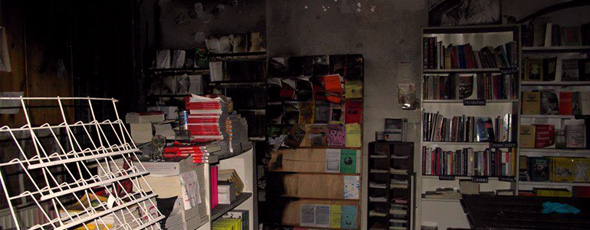
Down a small alleyway off Whitechapel High Street, a short walk from London´s financial district, sits Britain´s oldest radical bookshop. Founded by Peter Kropotkin and Charlotte Wilson in the 1880s, it has been a hub for the city´s counterculture ever since – a pick up point for campaign materials, a meeting space for activists and a printer of radical literature (including the OT) as well as selling books.
But my visit is not on a normal day. In the small hours of the previous morning an attacker had forced open a shutter, broken a window, and set the inside alight. Next to the broken glass is a shelf full of volumes on George Orwell – perhaps Britain´s most quoted opponent of book-burning . The fire and water leaves his image distorted and charred. The books are reduced to an inseparable block of pulp.
A throng of volunteers have gathered for the clear-up. Some are anarchists, others are showing solidarity with a group that has for so long shown solidarity with others. The atmosphere is somehow both cheerful and defiant. There is a human chain carrying salvageable books up the stairs. As there seems to be quite a queue forming, I join the other group, tasked with the soul crushing job of picking, cataloguing and disposing of the books that are damaged beyond repair.
We organise ourselves into sorters and cataloguers, the latter of whom playfully get called the bureaucrats. “Hey bureaucrat – I´ve got five copies of Thinking Housing´ here, can you note that down?”. “Bureaucrat, are you listening? Five Anarchy in Actions”. Becoming aware of the managerial system we are inadvertently mimicking we decide to change tack and buddy up, instead rotating roles. No more bureaucrat-worker divide. As it turns out, it´s more efficient too.
In a way it is a cheerfulness of necessity. The job of noting down books for the scrapheap is a sad one. The camaraderie is the only alternative to tears as we clock up three, four, five hundred volumes. The un-salvageable ones are taken away in sacks.
In their place comes cake and tea, followed by hot food. A bike powered sound-system pumps out funk tunes. Then a cheer across the building as the electrics flicker back to life. There´s a call out: ´does anyone need a job?´ followed by a wry chuckle and a movement, of yet more people who have recently arrived, to the back yard to start cleaning shelves.
The pile finished I head upstairs. It is an altogether happier scene. Thousands of books are piled from floor to ceiling: Zapata of Mexico, Mutual Aid, a history of Anti-Fascist Action. Squeezed around the edge are tens of people, with standing room only, jay-cloths in hand, scrubbing, chatting, restoring and ruminating. Instead of the choking stench of ash that overwhelms the downstairs, the fresh odour of cleaning spray fills the air. One by one the books are lovingly relieved of their sooty second-covers and returned to their former glory. The items destroyed are just a fraction of those that remain.
Three hours later and the shop is transformed. Everything has been removed, the fire blackened walls are being cleaned, and staff predict they will open again by Monday. 60 volunteers with no discernible leader have pulled off an awe-inspiring display of self organisation.
If the attacker´s plan was to make important ideas disappear down the memory hole, it looks as if it has spectacularly backfired. As the clean-up operation shows, there is more than one way to encounter an idea. One is to read about it. But wholly more powerful is to experience it. And so it is today that written concepts are lived in reality and anarchy is demonstrated in action.
Tim Gee is an author and activist based in London. His essay collection ‘You Can´t Evict an Idea’ will be published later this month.









